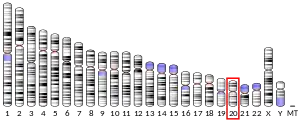ACSS2
Acyl-coenzyme A synthetase short-chain family member 2 is an enzyme that in humans is encoded by the ACSS2 gene.[5][6]
Function
This gene encodes a cytosolic enzyme that catalyzes the activation of acetate for use in lipid synthesis and energy generation. The protein acts as a monomer and produces acetyl-CoA from acetate in a reaction that requires ATP. It is also essential for the production of Crotonyl-CoA which activates its target genes by crotonylation of histone tails. Expression of this gene is regulated by sterol regulatory element-binding proteins, transcription factors that activate genes required for the synthesis of cholesterol and unsaturated fatty acids. Two transcript variants encoding different isoforms have been found for this gene.[6]
Metabolic production of acetyl-CoA is linked to histone acetylation and gene regulation. In mouse neurons, Mews et al.[7] identified a major role for the ACSS2 pathway to regulate histone acetylation and neuronal gene expression. Histone acetylation in mature neurons is associated strongly with memory formation. Chromatin becomes acetylated in specific regions of the brain, such as the hippocampus, in response to neuronal activity or behavioral training in rodent.[8] Such acetylation correlates with the increased expression of a set of 'immediate early' genes,[9] which encode proteins that broadly mediate changes in the strength of connections between neurons, therefore facilitating memory consolidation.[10] In the mouse hippocampus, ACSS2 binds directly to immediate early genes to 'fuel' local histone acetylation and, in turn, their induction for long-term spatial memory.
References
- GRCh38: Ensembl release 89: ENSG00000131069 - Ensembl, May 2017
- GRCm38: Ensembl release 89: ENSMUSG00000027605 - Ensembl, May 2017
- "Human PubMed Reference:". National Center for Biotechnology Information, U.S. National Library of Medicine.
- "Mouse PubMed Reference:". National Center for Biotechnology Information, U.S. National Library of Medicine.
- Luong A, Hannah VC, Brown MS, Goldstein JL (August 2000). "Molecular characterization of human acetyl-CoA synthetase, an enzyme regulated by sterol regulatory element-binding proteins". The Journal of Biological Chemistry. 275 (34): 26458–66. doi:10.1074/jbc.M004160200. PMID 10843999.
- "Entrez Gene: ACSS2 acyl-CoA synthetase short-chain family member 2".
- Mews P, Donahue G, Drake AM, Luczak V, Abel T, Berger SL (May 2017). "Acetyl-CoA synthetase regulates histone acetylation and hippocampal memory". Nature. 546 (7658): 381–386. Bibcode:2017Natur.546..381M. doi:10.1038/nature22405. PMC 5505514. PMID 28562591.
- Schmitt M, Matthies H (1979). "[Biochemical studies on histones of the central nervous system. III. Incorporation of [14C]-acetate into the histones of different rat brain regions during a learning experiment]". Acta Biologica et Medica Germanica. 38 (4): 683–9. PMID 525146.
- Peixoto L, Abel T (January 2013). "The role of histone acetylation in memory formation and cognitive impairments". Neuropsychopharmacology. 38 (1): 62–76. doi:10.1038/npp.2012.86. PMC 3521994. PMID 22669172.
- West AE, Greenberg ME (June 2011). "Neuronal activity-regulated gene transcription in synapse development and cognitive function". Cold Spring Harbor Perspectives in Biology. 3 (6): a005744. doi:10.1101/cshperspect.a005744. PMC 3098681. PMID 21555405.
11. Sabari BR, Tang Z, Huang H, Yong-Gonzalez V, Molina H, Kong HE, Dai L, Shimada M, Cross JR, Zhao Y, Roeder RG, Allis CD(2015). Intracellular crotonyl-CoA stimulates transcription through p300-catalyzed histone crotonylation. Mol Cell. 58(2):203-15
External links
- Human ACSS2 genome location and ACSS2 gene details page in the UCSC Genome Browser.
Further reading
- Kimura K, Wakamatsu A, Suzuki Y, Ota T, Nishikawa T, Yamashita R, Yamamoto J, Sekine M, Tsuritani K, Wakaguri H, Ishii S, Sugiyama T, Saito K, Isono Y, Irie R, Kushida N, Yoneyama T, Otsuka R, Kanda K, Yokoi T, Kondo H, Wagatsuma M, Murakawa K, Ishida S, Ishibashi T, Takahashi-Fujii A, Tanase T, Nagai K, Kikuchi H, Nakai K, Isogai T, Sugano S (January 2006). "Diversification of transcriptional modulation: large-scale identification and characterization of putative alternative promoters of human genes". Genome Research. 16 (1): 55–65. doi:10.1101/gr.4039406. PMC 1356129. PMID 16344560.
- Lehner B, Sanderson CM (July 2004). "A protein interaction framework for human mRNA degradation". Genome Research. 14 (7): 1315–23. doi:10.1101/gr.2122004. PMC 442147. PMID 15231747.



